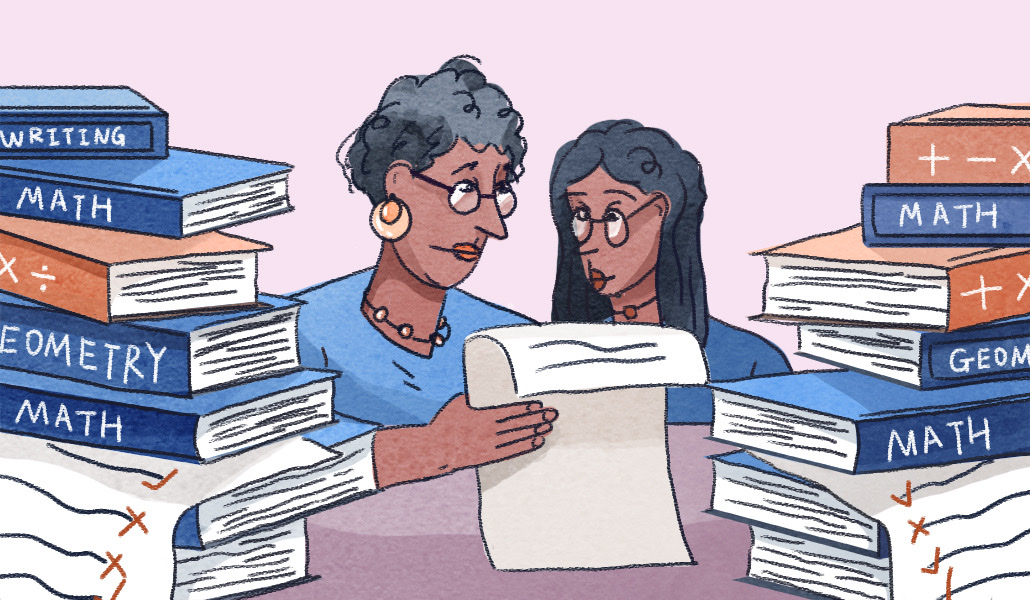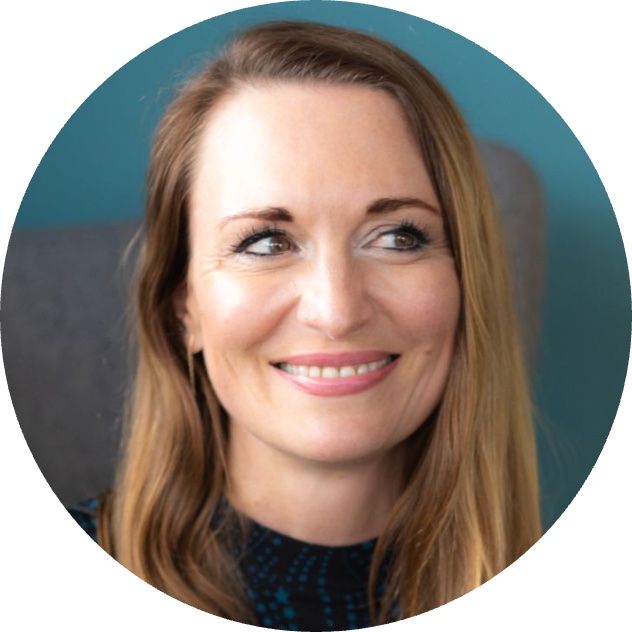How the pandemic changed parents’ relationships with their kids and jobs

This article is part of a series examining the various ways that the overhaul of organizations’ working models around the world, triggered by the coronavirus pandemic, is affecting working parents with desk-based jobs, and how their relationships between their kids and jobs have changed since the pandemic years. More from the series →
Victoria Usher gets up every day at 4 a.m. to help her 14-year-old daughter for two hours with her studies before she drops her at school and starts her workday. Not because she’s an overzealous mom, but because that’s the price many parents are still paying for how behind their children got in their education when the coronavirus lockdowns went into full force in 2020.
Unfortunately, that’s just the tip of the iceberg.
Usher’s youngest daughter was 10 years old when her mental health fell off a cliff, thanks to the strain of how much life changed with the arrival of Covid-19. She went from spending a maximum of one hour a day on her screen, to 12 hours a day within a week of schools being shut down. Overnight, her learning and socializing became entirely screen-based. It wasn’t long before her anxiety spiked and her self-esteem took a nosedive.
“It showed in her levels of aggression and mental health, which plunged rapidly throughout 2020 until recently,” said Usher. “This behavior affected her relationship with me – which had always been positive – her family, and her own self-image,” she added.
She became addicted to TikTok and other sites which her friends frequented. “We felt helpless as she was reliant on these sites for acceptance with her friendship groups,” added Usher. She’d always done very well at school, but her schoolwork also started to suffer badly, and that had a knock-on effect on her self-esteem, which manifested itself in “distressing self-hate behaviors,” said Usher.
At the same time, Usher was running her PR firm GingerMay full-time. Back then, no one knew how long the lockdowns would last, or what the long-term effects of the coronavirus pandemic would be. So Usher had to focus on stabilizing the business and ensuring they could keep people on payroll. “We had all these people relying on us to pay their mortgages, so we kind of had to say to the kids ‘we need to focus our attention on these people, so just figure it out and we’ll come to you next,” recalled Usher.
It’s been four years since Covid-19 brought the world to a halt, but the reality is that many parents are still trying to repair the serious psychological damage those early years of the pandemic had on their children. And there have been some extreme reverberations.
The anxiety of young people flew off the charts, and for some that’s led to some highly traumatic — and in some cases even fatal — consequences. For some parents, that’s meant that their outlook on work-life balance has changed forever, while others have had to reassess how they talk about work-related stress in front of their children. Many, including Usher, have paid for psychotherapists over the last four years, to help their children process and heal.
“We are working with her to manage her screen time, she’s also matured and is 14 now, so she has a little more self-control, although it’s a struggle every single day for her, and for us,” added Usher. “Phones have an inbuilt addiction that is hard for adults to control, let alone the young developing brain of a teenager.”
Their new pre-work and school routine, however, is starting to pay off. Usher’s youngest has the highest concentration in the mornings, so dedicating a set amount of time to her studies before school is a structure that works well for her.
‘A potential crisis looming’
Jules Griffith’s daughter was also 10 years old at the time of the coronavirus lockdowns. Looking back, she believes that the way emotionally-fuelled language was used during the peak coronavirus days, to describe the catastrophic developments worldwide, has had a direct impact on her daughter’s own outlook on life, and work.
The extremities of the language used at the time, even if true, have had a long-lasting impact on the psychology of children. For instance, kids were told, if they hugged their grandparent and they’re infected, they may cause their death. “Just when she was at the age where she would be starting to spread her wings and start to understand what independence looked like, what confidence beyond her parents and family looks like, everyone she trusted was removed. And she saw scared adults, with us all afraid to go out,” said Griffith.
That’s meant that Griffith, who is director of sales and marketing at London-based creative agency mccglc, has had to completely change how she talks about work when she’s at home. Despite being settled and content at her current employer, she is more cautious about how she talks about work, when at home with her daughter, since coming out of lockdown.
Whereas previously, she could have come home and confided if she had a difficult day at work – that language now has supercharged connotations for her daughter, since the pandemic. “Her mind will go back into Covid world, of everything is going to go wrong: mummy is going to get fired, we’ll lose our house. If something goes wrong, it’s catastrophic.”
As a single mother, Griffith feels she needs to be more careful about the language she uses about work, especially given it’s just herself and her daughter at home. “I pay the mortgage, there is no one else that’s going to bail us out. So that’s another factor. But how do I equip her to see that work can be challenging, but you work through it. Work can be brilliant, but also tough. We learn how to deal with each other, how to bounce off each other, I love problem solving. But where I’m thinking work has been really challenging today, and I need to think of a solution – she hears, mummy’s going to lose her job.”
The long-term consequences of the coronavirus pandemic and the restrictions governments imposed to curb its spread, have been well documented. The delay in their education and social skills have been repeatedly highlighted as challenging side-effects of this so-called Covid generation. WorkLife has also reported on the challenges of Gen Z entering the workforce in the post-pandemic era. But there remain reverberations for those even younger, in terms of how they view and cope with work, in future.
“We’ve got this potential crisis looming, where not even the older teenagers but these younger teenagers who don’t understand or who may find it challenging to deal with work, because they’ve seen work come into the home and just have to be coped with,” added Griffith.
No one has ‘I wish I went to more meetings’ on their headstone
But for other parents, the isolation methods used by countries to try and stamp out the spread of Covid-19, had even more devastating consequences. Cliff Jurkiewicz’s eldest son Kyle was 26 years old when he died in 2020 – a tragedy that Jurkiewicz believes occurred because of the enforced isolation that was imposed by governments to curb the spread of the virus.
Kyle had experienced long periods of isolation from a young age. He was diagnosed with Leukemia when he was 4 years old, and spent the following years until he was 9 years old extremely isolated from other kids, while he was treated until his body kicked the cancer into permanent remission. That early isolation had “a profound effect” on his mental health, stressed Jurkiewicz. Not long after, he was diagnosed with bi-polar, a mental health condition that affects your moods, which can swing from one extreme to another, and can also involve protracted periods of severe depression.
Having already shouldered an enormous health-related burden throughout his life, Kyle started to self-medicate, to try and cope. By the time the pandemic hit, he’d been out of rehab 11 times.
“I myself am a recovering alcoholic, and will be 10 years [sober] in June,” said Jurkiewicz. “So I knew what he was going through on some level, trying to be a young person in recovery and battling what we call a dual diagnosis: an addiction and a mental health condition — they feed off each other,” he said.
Before the pandemic caused international lockdowns, Kyle had been on the up. He had a good job, had returned to university to study, and had been sober for a year. But once the pandemic hit, the restaurant he worked at closed down, and he struggled to land a new job due to lockdown restrictions. Then his therapist had to cease their visits, where he lived at Sober Living – the safe housing that provides supportive, structured living conditions for people exiting drug rehabilitation programs. “In the state of Pennsylvania, you can’t get your meds unless you see your psychiatrist, but they weren’t allowed in,” said Jurkiewicz. “So he went six weeks without his medication or therapy. This is what we did to people.”
Not long after, Kyle took his own life.
Jurkiewicz and his wife (stepmom to Kyle) set up Kyle’s Wish Foundation, a charity that provides aviation experiences to people in recovery, in honor of Kyle, who himself used to drive people long distances to unite them with family. Jurkiewicz pilots many of these trips.
Needless to say, the experience has had a profound effect on how Jurkiewicz manages his job and his remaining family of his wife and two younger sons. He has spent a lot of time in cemeteries over the last few years, visiting his son and also accompanying those he flies as part of Kyle’s Wish Foundation.
“No one has the words: ‘I wish I’d done more meetings on their headstone,’ or ‘I wish that I’d been promoted to a different role,” said Jurkiewicz. “What you see is [a] loving father, mother, sister, dedicated to their community – it’s the things those individuals really valued that end up on their headstone and being in their permanent memory. It’s never about work,” added Jurkiewicz. Much as Jurkiewicz loves his job as vp of global strategy and general manager of the customer advisory board at HR tech company Phenom, he’s clear on his priorities.
That means never skipping his youngest sons’ ballgames, awards ceremonies they have, or any other important event in their lives. “I canceled a trip with a client for that [to go to his son’s math award event]. It’s only something that will last 10 minutes to watch him go up on stage – but those are the moments that matter.”
For Jurkiewicz, the grief he carries from the loss of his son is a constant reminder that the pressures or demands of work will never overshadow his work-life balance again.
”The most important things to me are being a father, and a husband – nothing gets in the way of that. I think a lot of people went through that exercise, you know, after the pandemic and just said: never again,” said Jurkiewicz.



